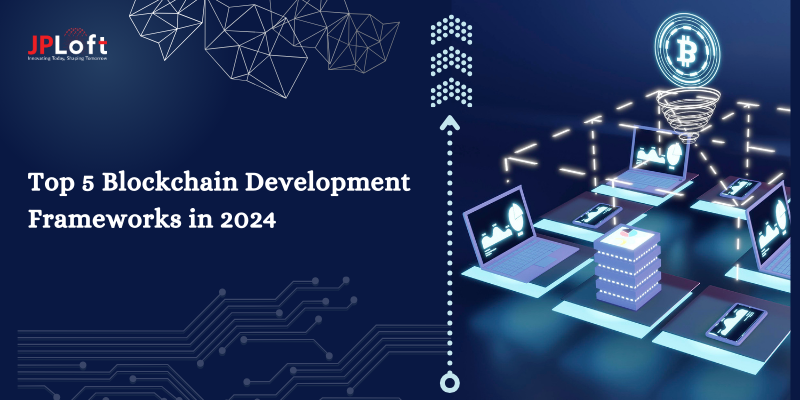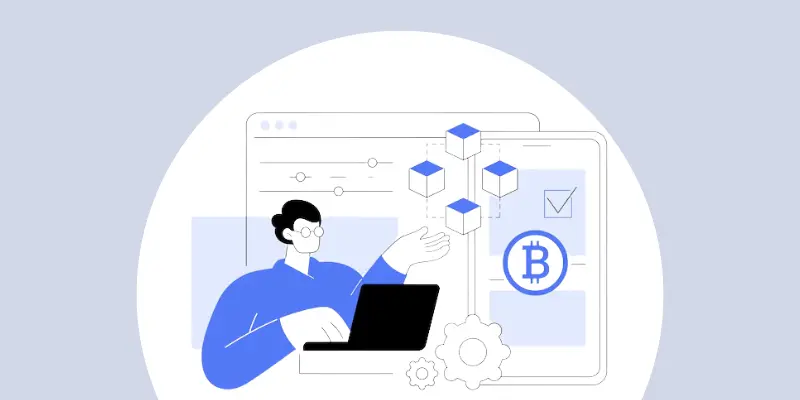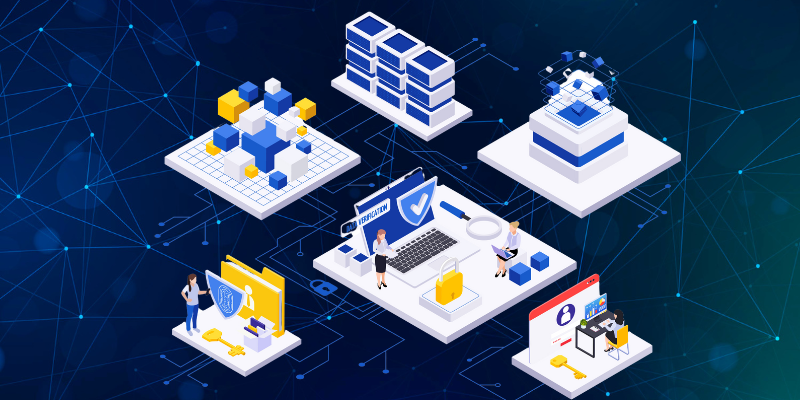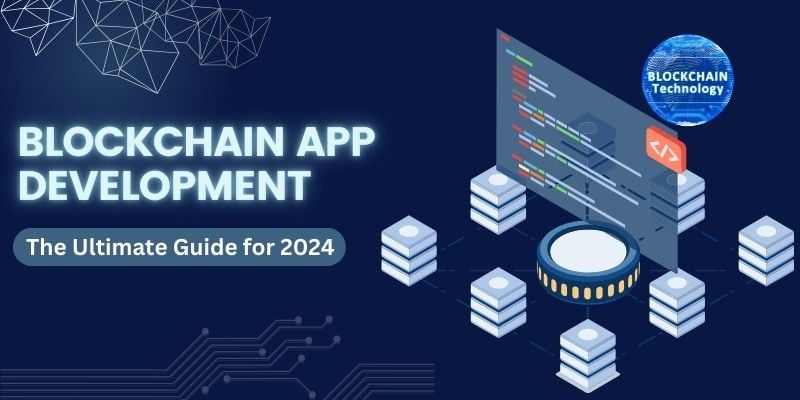Blockchain has revolutionized our way of thinking about and utilizing the web. Numerous businesses are switching to blockchain to increase the transparency of their operations, reduce the cost of transactions, and remove the need for intermediaries. Because all participants in the network have access to and confirm transactions, the blockchain does away with a centralized database.
It creates trust and increases openness among the network's participants. The decision to switch to a blockchain is challenging. One of your most essential choices is choosing the right blockchain technology to run your company. Hire software developers to develop blockchain applications for their requirements is possible.
What is Blockchain Specifically?
Blockchain is a peer-to-peer network built on the principle of decentralization within networking. Blockchain's decentralization is similar to Napster's by ensuring that each participant on the network is connected. Blockchain is identical to the typical server-client system that you're using. Each node acts as a server and client on the blockchain.
A ledger, also known as a public database or record, is created and distributed between the nodes that form the blockchain. It keeps track of interactions in the network, and the majority consensus in the blockchain network confirms transactions.
The ledger will be distributed to all the nodes on the network after an update is approved and then added to the. The nodes can access the ledger at its current condition, encompassing all the transactions that took place in recent years.
It is not a secret that all businesses have adopted blockchain technology to facilitate secure goods transfers, like homes, digital documents, and money. Blockchain technology is a critical element of cryptocurrency as well as ICO movements.
Large global investors are eager to benefit from the benefits of blockchain-based strategies. Blockchain technology is still at its beginnings and increasing in demand as a method of creating personalized software. Many companies provide:
-
Custom Blockchain online solutions appropriate for recording events and medical information,
-
The management of employee portfolios, and
-
Other processes in a blockchain Web Development Company.
Top 5 Blockchain Development Frameworks in 2025
There are more blockchain development frameworks that we can't cover in one blog article. Our blog will focus on the most frequently used and popular Blockchain design frameworks.
1. Hyperledger Fabric
Though permissionless networks like Ethereum have numerous advantages, certain companies require absolute anonymity, which open blockchains can't provide. This is why the need for private networks is born, and Hyperledger Fabric plays an essential function in this regard.
Hyperledger Fabric is a type of blockchain network that goes beyond the boundaries of a single sector, enabling designers to develop solutions for connecting components based on blockchain into and out. This is because of the modular design.
The platform is password-protected, meaning only authorized users can access the data. The platform was created to be used by large industrial companies. Additionally, there are 'chain codes' that are intelligent contracts in Hyperledger Fabric.
Hyperledger Fabric brings together the advantages of blockchain technology, enhanced data security, and increased privacy. It is a reliable platform that offers good performance, flexibility, and the capacity to establish a transparent identity management system to control those who can join the network.
This is an example of the blockchain system that even businesses not part of cryptocurrency-related projects could benefit from. It is constantly getting more efficient. In the month of January 2020, Hyperledger Fabric 2.0 was launched. This update enhanced data privacy and enabled decentralized intelligent contract management. Hyperledger Fabric is, on the contrary, not suitable for people who want to be transparent. The platform is only used in some scenarios because the market mainly focuses on public blockchains.
Hyperledger Fabric is perfect for banks concerned about security and privacy since it allows the use of confidential private transactions and contracts. Other companies, such as health care, government agencies, and supply chain companies, could use the technology to create their private blockchain networks. HP, Amazon, Visa, Walmart, and other businesses have embraced the technology.
Despite the fierce competition, Enterprise blockchain developers still favor Hyperledger Fabric, one of the most sought-after options. According to IDC, the amount invested in Enterprise blockchains in Europe is up at least 60% from the previous year. An ongoing demand for the blockchain-based development platform is anticipated.
2. Ethereum
Start using Ethereum is, in my opinion, the best option. Ethereum is among the most rapidly growing networks and is considered by many fintech app developers across the globe to be one of the most robust blockchain-based platforms for development. Ethereum, a blockchain technology released in 2013, is gaining popularity due to its support for smart contracts and decentralized applications (DApps) that allow blockchain technology to achieve its fullest potential.
Ethereum is a free and open-source platform that is based on that of the Proof of Work. Fintech developers can use the platform to build blockchain-based applications in the Ethereum Virtual Machine environment.
Ethereum also includes its programming language, Solidity, and its cryptocurrency, Ether, which performs transactions and executes programs using Ethereum. Ethereum network. As per the Ethereum Price, an ETH was worth $2,236 by the end of May 2021, making it the 2nd most sought-after cryptocurrency following Bitcoin.
Due to its decentralization, Ethereum has a high degree of security, low downtime, apprehensibility, and a massive group of users. Of course, the system comes with flaws since no perfect system exists. There are, for instance, delays in processing, high transaction costs, and issues with scaling compared with other platforms. It is essential to highlight attention to the fact that Ethereum is a platform that the Ethereum team is beginning to troubleshoot.
In 2021, they will join forces with Polygon to develop an Ethereum-compatible blockchain network among the Ethereum team's actions. In addition, Ethereum is undergoing an upgrade known as Ethereum 2.0, which is based on using the Proof of Stake (PoS) principle to increase security and scale while also making gas calculations more efficient.
The advent of DeFi in the year 2020, as well as NFT form 2021 onwards, both of which are closely linked to Ethereum and Ethereum, have boosted interest in the network. The number of Ethereum-related projects that are awe-inspiring is staggering.
Alongside banking, it is utilized to develop voting systems, safe medical information storage, games, and social networks. The variety of intriguing Ethereum uses is expanding, and Ethereum is expected to be among the most exciting blockchain platforms for development in the next few years due to constant developments.
3. Polkadot
Gavin Wood, one of the Co-Founders for Ethereum Polkadot is one of its co-founders, offering innovative blockchain-based platforms like Polkadot. This Polkadot token has grown in value by 1238 percent in August 2020. The platform has been able to establish itself as an important market player.
Polkadot is a system that enables a multi-blockchain blockchain decentralized in the exchange of information. Within this network, developers can create their blockchains and join existing ones. Polkadot's unique design can support parachains and permit you to utilize permissions data stored on the private blockchain into an open blockchain. There is a great chance to be one of the leading blockchain platforms for development in the future as it tackles scaling and interoperability in blockchain.
Polkadot has many benefits for users and developers of blockchain. The first is that the platform allows the transmission and processing of information between public and private blockchains swiftly and safely. It is also scalable and beneficial. It also broadens the possibilities for developers of decentralized apps. As an example, Polkadot is a platform that can be used to develop protocols, allowing individual blockchains to use the same security tools.
Most blockchain specialists see Polkadot as an innovative solution, making the notion of a single blockchain much more feasible than it was previously. Polkadot is an incredibly new initiative. Therefore, a few examples are used to evaluate this technology's effectiveness. Many criticize the technology for its inability to decentralize due to its dependence on its currency, DOT.
Polkadot is only involved in blockchain-based projects, such as DeFi or NFTs. In 2020, the company partnered with the Chainlink initiative to hire DeFi programmers. The platform can build chains of transactions, IoT chains, Oracle chains, identification chains, data distribution chains, and different types of chains. Its popularity is rising. We hope that exciting and new Polkadot community initiatives will soon be on the horizon.
4. Cardano
Cardano is well-known for its fault-tolerant performance, decentralization, and transaction speed. All of these are fantastic characteristics of Cardano. ADA is a cryptocurrency that uses blockchain technology and has been ranked third based on the market value in 2021, being second only to Bitcoin and Ethereum. Given its successes, Cardano has no choice but to make our top list of blockchain-based development platforms in 2025.
Cardano is an open-source, proof-of-stake blockchain platform. It has a multilayered structure and its cryptocurrency, ADA. Cardano is built on the principle of Proof-of-Stake, which takes the entire quantity of bitcoin that is in circulation. It also has the capability of smart contracts. One of the most intriguing features is its decentralization.
The platform will be decentralized, and it will be home to around 1500 validators. Cardano is an incredibly robust and flexible cryptocurrency. Its transactions are more efficient and cost less than those made on Ethereum. Ethereum network.
A further benefit is the possibility of earning earnings from staking ADA coins. Security is a significant aspect of the system. Ouroboros is one of the Cardano protocols that provide mathematical evidence of the system's reliability even when nodes have gone off for short periods due to system failure or power interruption. Due to its decentralization, it is very stable.
Cardano is an "academic blockchain" developed after extensive study and testing. It indeed increases trust in the network. However, it can also slow the advancement of the platform. This is the cause of many complaints because the marketplace is highly competitive, and the speed at which new ideas are developed is crucial.
The main goals of Cardano are smart contracts, decentralized applications, and sidechains. Cardano also provides NFTs, which will propel NFTs to the forefront of the blockchains in 2021. Cardano is being utilized to develop markets for NFTs and DEXs stabilized coins, lending protocols, and other applications.
Its Cardano team has an established method for advancing the technologies used. The platform is expected to undergo many changes over the next few months, making it a better option for establishing Blockchain-based businesses.
5. Solana
As per many developers, Solana is another name well-known in blockchain technology and is among the most effective blockchain-based developing platforms. Regarding the amount of money blocked, the Solana blockchain is among the biggest in DeFi.
Solana stands out from the other platforms in a variety of different ways. The first-level blockchain does not have extra chains or sidechains. It is a decentralized and accessible source. It is a cryptocurrency known as SOL. Solana blockchain nodes receive a fee for processing SOL transactions.
Unlike most blockchains, there's no requirement for a minimum sum of money to establish a new node. Solana utilizes Proof of History, an innovative cryptic method (PoH). This increases the speed of processing transactions as well as scalability. As per Solana Foundation representatives, the present throughput of transactions is around 60,000 per second.
Solana's main advantages extend beyond the speed of transaction and price. In addition, the platform is very scalable and compatible with projects. Also, it offers a great user experience that needs to be improved in numerous decentralized projects. Since Solana is a relatively new blockchain technology, it still needs widespread acceptance.
Many initiatives are being developed. Many functions are currently in the testing stage, which could mean that there is a possibility for a crash. Additionally, some developers believe that more than the blockchain's decentralization is needed. However, Solana has many potential advantages over cryptocurrencies like Ethereum.
Although Solana was in the market for a while, the growing interest in NFTs led to an impressive rise by 2021. Since non-fungible mining tokens like Solana are more affordable and speedier than Ethereum, numerous individuals and organizations looking to use non-fungible tokens selected them to develop further. Several DeFi-related projects, such as accounts, wallets, DEXs, and stablecoins, have been built upon Solana.
Solana's current ecosystem includes around 200 companies, as per numerous sources. The network continues to grow. In addition, the Solana Foundation was established in 2020 to help develop the natural environment. For this, Solana Labs donated 167 million SOL coins to the foundation. In addition, Solana developers will build the cross-chain bridge to Ethereum by the end of October 2020, permitting asset transfers across the two blockchains.
What is the best way to Choose an Appropriate Blockchain-based System for your Business?
Let's get to the matter of finding the best technology solution for your business following the top blockchain-based development platforms in 2025. Be aware of the essential elements to ensure they meet your business needs when selecting a blockchain platform for your venture. They could comprise:
Level of Confidentiality
If you're looking to build an enterprise blockchain with strict security requirements and high levels of privacy, then you must look at private networks like Hyperledger Fabric. Select one of the publicly accessible blockchains if the goal of your business is to create an open-minded initiative with the highest level of openness.
Security
Security always comes into play. Different blockchains have strategies that make sure that information is securely transferred and stored.
Decentralization
Businesses and customers are gaining awareness about the advantages of using decentralized systems. Determine the amount of decentralization your project will require and then choose the best platform to deliver the necessary decentralization.
The Speed and Cost of Transactions
Many customers look at these options when choosing which blockchain apps to select. If you opt to utilize a platform that has a higher gas tax, then your development team must think about making the platform more effective.
Scalability
The blockchain's capacity is contingent on the objectives you set in your company and the demands to be met, as predicted by the algorithm. Ensure that the blockchain platform you pick can handle growing workloads and maintain the highest efficiency.
The Rate of Adoption
In the end, when choosing an appropriate blockchain development platform, the more popular an option is, the greater the number of users they are likely to draw with little effort. To achieve this, look into the acceptance and performance of different platforms in the marketplace.
Hire a blockchain developer who analyzes your requirements and suggests the most suitable solution is highly recommended. Expert blockchain developers can quickly determine which one can best meet the requirements of your business by working with various frameworks. Various top Blockchain development companies specialize in developing decentralized apps and smart contracts.
Conclusion
Blockchain technology is expanding rapidly. More innovative solutions are being developed daily while existing ones are updated. If you are considering a blockchain development platform to build your company, consider the blockchain's functionality and reputation in the marketplace, as established solutions are more likely to be successful.
To effectively start a cryptocurrency project, you should select the correct system and find a team with the capacity to realize the full potential of blockchain technology. Blockchain technology could be a part of the future possibility of a world with decentralized and centralized designs. As with any other new technology, Blockchain technology will be disruptive initially. However, it could also facilitate creating a community encompassing traditional methods and advancement over time.
Although there are a variety of blockchain platforms, those listed above are among the most desired. We have explained the concept of blockchain, outlined how it's changing our worldview as we know it, and listed the top blockchain-related platforms in this list.
We evaluated the strengths and drawbacks of each, looked at some of the most famous usage instances, and examined the different ledger types, consensus algorithms, and cryptocurrencies used on the platforms. Given the multitude of platforms available for creating blockchain-based applications, the blockchain can be challenging to comprehend. One of the best ways to learn is by starting from the foundations and understanding how they function under the scenes.
FAQs
1. What will be the five most crucial blockchain-related development frameworks in use by 2025?
In 2025, the five most popular blockchain development frameworks include Hyperledger Fabric Ethereum, Binance Smart Chain, Corda, and Polkadot.
2. Why is Hyperledger Fabric regarded as an industry-leading blockchain framework for development?
Hyperledger Fabric is known for its permissible blockchain design that provides high security and scalability. The system's modular structure allows the flexibility of use and is supported by the Linux Foundation, ensuring robust community involvement and constant development.
3. What is it that makes Ethereum distinguish itself from other blockchain development frameworks of 2025?
Ethereum remains a trendy option due to its smart contracts capabilities, allowing decentralized apps (DApps) to be developed. In the coming Ethereum 2.0 upgrade, scaling issues will be solved, increasing its popularity for various blockchain-related projects.
4. What makes the Binance Smart Chain framework differ from other frameworks for developing blockchain?
Its association with its counterpart distinguishes Its Binance Smart Chain (BSC),the Ethereum Virtual Machine (EVM) that simplifies developers' transfer process of Ethereum-based apps. The system's dual-chain design offers speed and cost-effective transactions, making it a popular choice for those looking to improve efficacy and value.
5. What advantages does Corda provide as a blockchain technology development framework by 2025?
Corda is highly regarded for its emphasis on privacy and scaling in enterprise-level solutions. Through its permission design and focus on interoperability, Corda is ideal for demanding commercial and financial applications and is a preferred option for businesses that require reliable and secure blockchain solutions.













Share this blog